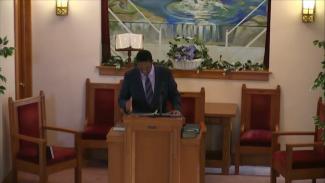2017 Broadcasts
Choose from all 2017 broadcasts or select a topic from the menu.How important was unity to the early church? How did Paul endeavor to keep unity? On what matters did he stick to principle? Why was the early church split over issues like circumcision and the customs of Moses? What can we learn from them about unity and dealing with conflict? Can the church always be united? Were the apostles always in agreement?
Amidst the accusations that Paul was a people pleaser, how did Paul establish the validity of his gospel message? How many gospels are there? What was Paul’s emphasis in the gospel? How could changing this emphasis lead to another gospel? What is the relationship between law and grace? What was the gospel for Paul? What do these things mean for Christians today? Should western culture push tradition on other cultures as we share the gospel?
John Spellman preaches at Spring Hill SDA on Passing the Baton for Deacon and Deaconess Day. Jesus commissioned the preaching of the gospel to faulty human beings. What message is there in that for the church today? How does someone know when they are ready to serve? Why do the same people always hold the same offices in the church? What can we learn from John the Baptist or Moses about leadership? What can we learn from Jesus?
This quarter we focus on the book of Galatians. What can the life of Paul, starting out as Saul of Tarsus, tell us about the context of Galatians? What were the historical circumstances under which the book was written? What happened in the early church between the Jewish and Gentile converts to Christianity? How can this help us to understand the themes of the book of Galatians?
As we conclude our study on the books of 1st and 2nd Peter, what are the major themes brought out in these epistles? What does Peter have to say about persecution, the suffering of Christ, the Second Coming, and the Judgment? What do these things mean for Christian faith and practice? Are Christians saved by grace to continue in sin? How did Peter view the importance of Scripture?
Peter continues to warn about scoffers, false prophets, and teachers. He talks about the misinterpretation of Paul’s writings to promote lawlessness. What are the dangers in losing faith in the second coming of Jesus? Should Christians continue to hope in the advent of Jesus even though it hasn’t happened in 2000 years? Is there a reason behind the apparent delay? Will the prophecies about the Day of the Lord really come to pass?
Part 4 to the presentation on the Bible, Pastor Mirra discusses manuscript evidence making a compelling case for belief in the Bible. How does the Bible's reliability compare with that of other ancient manuscripts like the writings of Socrates, Plato, and other historical figures? Does the record show we can trust the Bible? What does all this mean for God's presence in our lives today?












